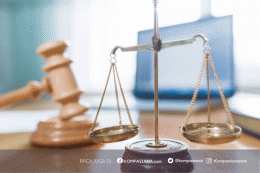In the Indonesian legal system, judges are state officials protected by the principle of judicial immunity. This protection is not a form of absolute immunity that exempts judges from all forms of responsibility, but rather guarantees that judges can decide cases without fear of pressure or intimidation, including the threat of lawsuits from parties dissatisfied with the decision. This immunity is explicitly regulated in Article 16 of Law Number 48 of 2009 concerning Judicial Power, which states that judges cannot be sued either civilly or criminally for decisions they render as long as they are carried out in accordance with the law and their authority.
Conceptually, this protection rests on the principle of judicial independence, a universal principle of the rule of law. This independence not only means freedom from executive and legislative intervention, but also freedom from pressure from parties directly involved in the case. A lawsuit based solely on dissatisfaction with a final decision---especially one that has become legally binding --- will almost certainly be rejected by the court.
Furthermore, if the lawsuit contains elements of defamation or slander against the judge, the lawsuit could become a legal problem for the plaintiff. Articles 310 and 311 of the Criminal Code stipulate that defamation committed in public, including against state officials, is subject to criminal sanctions. In this context, attacking the integrity of a judge with unproven accusations not only undermines the dignity of the judiciary but also sets a bad precedent for judicial independence in deciding cases.
From a legal philosophy perspective, suing a judge after a valid and binding decision violates the principle of res judicata pro veritate habetur, the assumption that a judge's decision is correct until overturned through a legitimate legal mechanism (Marzuki, 2005). This principle maintains the stability of the legal system to prevent infinite regress ---a legal process that continues to repeat itself without end. If every losing party could sue their own judge, legal certainty would collapse, and the judiciary would become an arena for revenge.
The legal consequences of such an attempt could affect two areas simultaneously: first , the failure of the lawsuit due to its violation of the principle of judicial immunity; second, the potential criminalization of the plaintiff if proven to have committed defamation or other unlawful acts. Therefore, strategically, suing a judge simply out of dissatisfaction is a self-defeating action ---one that destroys one's own position.
In the case of pardon recipients, the issue becomes more complex. Pardon is a presidential prerogative granted based on legal and political considerations, not an assessment of judicial error. Ethically, if a person believes they are innocent and fully believe in the correctness of their position, they should firmly refuse pardon from the outset. Such a refusal would demonstrate moral integrity and consistency in their beliefs.
Accepting an abolition implicitly acknowledges the existence of the court's decision, even if you disagree with its substance. Therefore, after accepting an abolition, filing a lawsuit against the judge based on the content of the decision is not only contradictory from a legal standpoint but also undermines the state's authority ---in this case, it undermines the President as the issuer of the abolition and the judicial system as the adjudicator of the case.
From a state ethics perspective, such behavior demonstrates a self-interest orientation that places ego above institutional harmony. However, in Pancasila democracy, personal interests must be subordinated to the greater national interest. Notonagoro (1975) emphasized that Pancasila requires harmony between the interests of individuals, society, and the state within a unified whole.
Social contract theoretical approach is also relevant here: when individuals benefit from state decisions---including abolition---they are morally bound to abide by the social contract that governs the relationship between them and state institutions. Violating this contract by attacking the institutions that have provided benefits is a form of breach of trust that undermines the legitimacy of citizen-state relations.
Furthermore, these legal consequences must also be viewed within the framework of checks and balances . Judges are responsible for monitoring violations of the law, while the President is responsible for political control over the law. Confronting the two through manipulative actions will upset this balance and, in the long term, could erode public trust in all branches of government.
Therefore, a possible solution is to develop derivative regulations governing the ethics of state pardon recipients. These regulations could include a clause prohibiting lawsuits against judges except in exceptional circumstances, such as clear evidence of a violation of the judicial code of ethics. This would safeguard the President's prerogative, and prevent the integrity of the judiciary from being compromised by opportunistic maneuvers .







